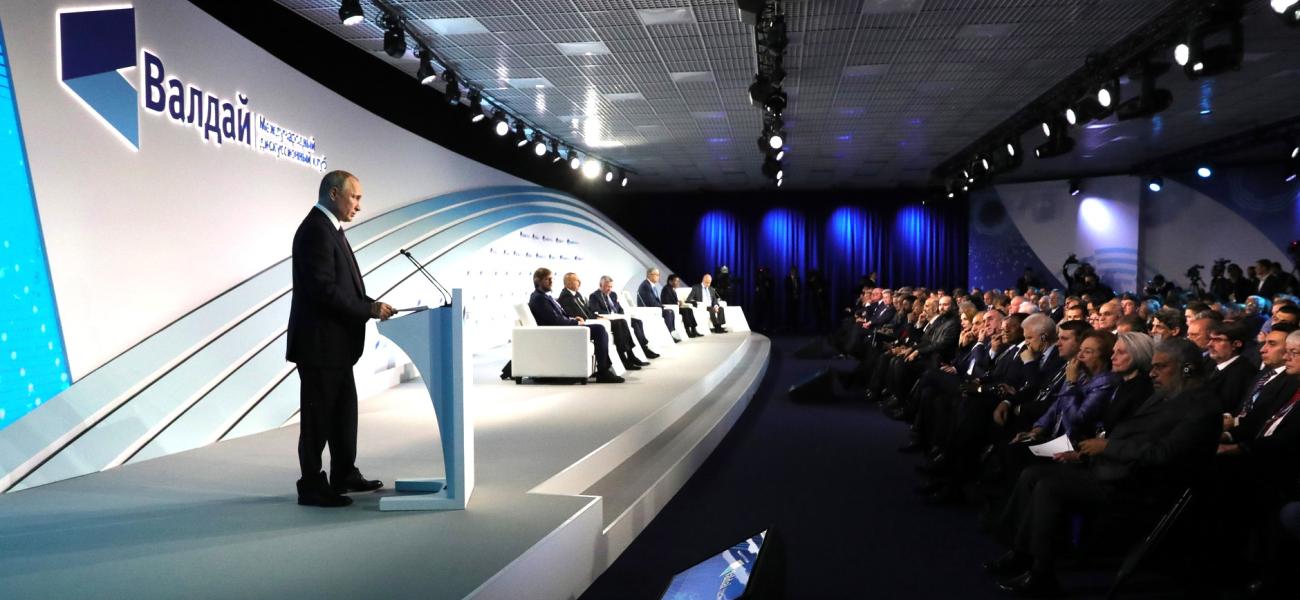In the Thick of It
A blog on the U.S.-Russia relationship
Valdai 2019: The Dawn of the East and the World Political Order
The message from this year’s annual meeting of the Valdai International Discussion Club was clear: The U.S.-led hegemonic world order is over, Pax Americana is dead and soon Russia, along with China, will lead the way in promoting a new, “democratic” word order. And what is a democratic world order? One in which independent states set the rules for “responsible behavior” and the United States and allies can no longer dictate the rules.
This year’s Valdai, unlike all previous meetings, ignored the West, focusing entirely on Russia, Asia and the Middle East. Taking advantage of Russian Energy Week, which was happening in Moscow at the same time as we were at the Valdai meeting in Sochi, Energy Minister Alexander Novak and OPEC Secretary General Mohammed Sanusi Barkindo traveled to Valdai to praise each other for the excellent cooperation between OPEC and Russia. According to Barkindo, the January 2017 agreement between OPEC and 10 other non-OPEC countries, led by Russia, to set limits on oil production “resuscitated the fortunes of OPEC.”
There was much mutual praise between Russian and Chinese officials and experts. Fu Ying, vice chairperson of the Foreign Affairs Committee of the Chinese National People’s Congress, described Russia as “a most important neighbor, a reliable strategic partner. Our close partnership is key for world stability.” Sergei Karaganov, dean at the Higher School of Economics, lauded the idea of a “greater Eurasia” in which both Russia and China will play a leading role. Both Russian and Chinese speakers highlighted the Trump administration’s trade war with China as a factor reinforcing the decline of the U.S.-led world order, claiming that the U.S. wanted to “stop China from rising.”
Putin revealed during the plenary session that Moscow was assisting Beijing in setting up an early warning system to prevent a missile attack on China. He spoke of an “unprecedented level of trust” between the two countries. He used the words “allies” and “strategic partners.” In previous Valdais, both Russian and Chinese speakers have explicitly denied that Russia and China will form an alliance. This time these denials were absent. Based on what was said during the conference, one could conclude that the two countries are indeed moving toward some form of a formal alliance.
For the first time, Africa was featured at Valdai, in anticipation of the first ever Russia-Africa economic summit to be held in Sochi Oct. 23-24. African and Russian speakers reminded the audience that the USSR helped African countries to gain independence form their colonial rulers and helped build post-colonial Africa. Russia largely withdrew from Africa after the Soviet collapse but is now returning. There was also discussion about whether Russia’s return will help African countries balance the Chinese presence on the continent.
The toughest criticism of the West came from Foreign Minister Sergei Lavrov, who recited a familiar litany of accusations against the United States and its allies, from supporting the mujahedeen in Afghanistan in the 1980s, and thus facilitating the rise of the Taliban, to the invasion of Iraq, the violation of U.N. resolutions in Libya, the illegitimate Western entry into the Syrian civil war (in contrast to Russia, which was invited to intervene by the Syrian government) and, of course, Ukraine, where the West supported a “fascist coup” in 2014.
Lavrov also criticized the Trump administration’s “deal of the century” for the Israeli-Palestinian question because it appears to have abandoned the two-state solution to which Russia, as a member of the Middle East quartet, is a party.
Lavrov accused the West of “trying to rewrite the history of World War II.” This was in response to a questioner who pointed out that the European parliament had recently published a resolution blaming the Molotov-Ribbentrop Pact for the outbreak of the war. When President Vladimir Putin was subsequently asked the same question, he said that Stalin’s repressions, the camps and the deaths he caused were a very dark page in Russia’s history. “But to say that the Soviet Union started the war on June 22, 1941, is outrageous.”
This year, Putin sat on the stage with King Abdullah of Jordan, President Ilham Aliyev of Azerbaijan, President Kassym-Jomart Tokayev of Kazakhstan and President Rodrigo Duterte of the Philippines, on his second visit to Russia. For the first time in many years, Putin’s speech was largely conciliatory and he did not attack the West. This was left to Duterte, who lashed out against the West for its hypocrisy on human rights, and defended his harsh treatment of drug dealers and others whom he named criminals.
Indeed, Putin praised U.S. President Donald Trump for his “brave actions” in reaching out to North Korea to avoid war, a product of Trump’s “non-standard thinking.” When asked how Russia would deal with an increasingly unpredictable United States during an election campaign and possible impeachment proceedings, he responded: “Life goes on and we will work with the United States.”
When asked by a Ukrainian participant why Russian TV has such negative coverage of Ukraine, he responded, “We should not present our closest neighbor in an unfavorable light.” (Sitting in the first row in front of him was Dmitry Kiselev, one of the most aggressive TV commentators on Ukraine.) But Putin also said, “Our TV channels are independent.”
So, the official Valdai message was that Russia will soon bestride the globe, active in all corners of the world, leading a new, peaceful order with China, India and other players in this multipolar system. There were warnings, however, that the world had to be prepared for escalating tensions with the West and the possibility of war.
Angela Stent, author of “Putin’s World: Russia Against the West and with the Rest,” attended her 16th Valdai meeting this year.
Photo: Putin speaking at Valdai 2019 in Sochi; the author is seated in the front row, third from the right.

